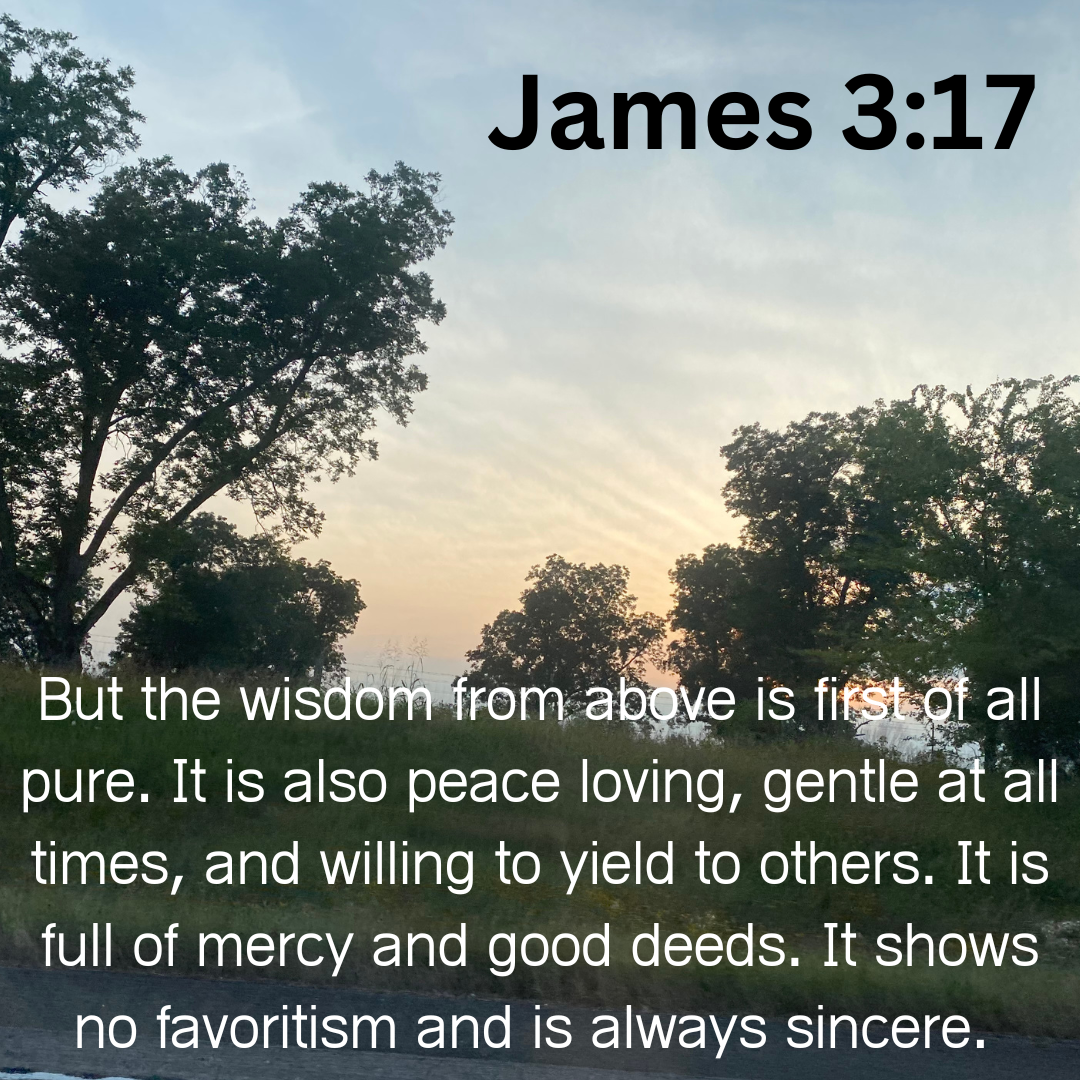My Friend James: Where’d You Get That Wisdom?
Not all wisdom is created equal. James 3:17 [NLT] says, But the wisdom from above is first of all pure. It is also peace loving, gentle at all times, and willing to yield to others. It is full of mercy and good deeds. It shows no favoritism and is always sincere. We believers clearly need the wisdom that comes from above – from God.
When you read James 3:17, you may be thinking about what I’ve heard preachers call “worldly wisdom” or “the wisdom of the world”. I’ve heard many sermons about that too. Sermons with disparaging words about our educational system (especially colleges/universities), or so-called liberals and their views. I don’t think this is the kind of wisdom that our friend, James, is concerned about. After all, he was not writing to people who were concerned about university students trying to come into the congregation and tell everyone that evolution is how we came about, since evolution as a replacement for creation hadn’t come about yet. Or that people should be able to be called by the pronouns they prefer, not by the ones that the English language designated for them. That was not a “thing” back in James’ day.
Ephesians 4:15, “speaking the truth in love, may grow up in all things into Him who is the head--Christ”
I believe that James was more likely concerned with people who thought they had some special information from God – some unique doctrine or more perfect take on scripture – and who were causing strife by trying to force this on their local church.
I don’t know about you, but I have seen a lot more of that going on in our local churches than any “worldly, liberal” doctrines being brought into the congregation. I have seen preachers and teachers come up with their own take on Sabbath keeping, the Holy Days, how much of the Mosaic law we must keep (and how to keep it), parenting, women’s roles, what kind of music is appropriate for praise and worship, the order of services and other similar subjects that have fractured congregations. In fact, I don’t recall having EVER experienced anyone trying to take over a church with so-called liberal university ideas or even trying to force others to agree with them.
James outlines a tall order for the parameters of heavenly wisdom.
· Pure
· Peace loving
· Gentle at all times
· Willing to yield to others
· Full of mercy
· Full of good deeds
· Without favoritism
· Sincere
This list is the opposite of what I have sometimes seen in action when someone brings in “new truth” or a “better understanding” of the word of God into a congregation.
James’ list shows us that if we really have wisdom that is coming from God, even the purest of new truth, we will not split friends or a congregation with it. Instead, we will focus on peace, first and foremost. We will give our truth gently rather than forcing it on others. We would be willing to yield to others, even if they disagree. We would show mercy to those who “don’t get it” or see things differently. We’d focus on doing good, more than forcing new truth so that our works would speak for our love for the church, and not just our words. We would not show any favoritism to those who agree with us. In doing all this, we would show a level of sincerity for the health and education of the congregation that is often lacking from human, worldly wisdom applied to a Biblical truth.
This is also the message of Ephesians 4:11-16, where verse 15 brings us what I think is the pivotal point: speaking the truth in love, may grow up in all things into Him who is the head--Christ--
Note that the author is talking about speaking the truth, not some false doctrine or worldly concept. Even the truth – especially the truth – must be spoken in love if we want our brethren and ourselves to grow into more Christ-like believers and if we want to call others into the faith using the truth.
The wisdom from above does not look at all like forcing some truth on anyone. The Rotary Club organization has a Four-Way Test that encourages Rotarians to think before they speak { The Four-Way Test - Wikipedia}.
· Is it the truth?
· Is it fair to all concerned?
· Will it build goodwill and better friendships?
· Will it be beneficial to all concerned?
Looks to me like James has an Eight-Way Test for speaking specifically to our brothers and sisters in Christ about any new truth we might be blessed to receive and share.
I hope you will continue to meet with me here and will share your own thoughts on the book of James.
You can write me any time at Nancy@DynamicChristianMinistries.org
